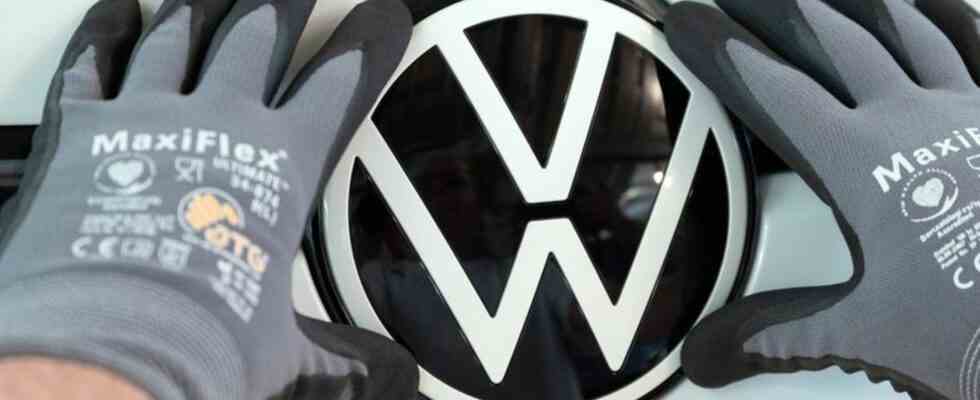automobile
Volkswagen with a leap in earnings – sales plummet
VW posted a significantly higher operating result in the first quarter than a year earlier. Photo: Sebastian Kahnert/dpa-Zentralbild/dpa
© dpa-infocom GmbH
Volkswagen does not have to worry about group profits. However, the sales figures are still not where they should be. And the Ukraine war is increasing the uncertainties.
Despite the chip slump and the uncertainties surrounding the war in Ukraine, the Volkswagen automobile group can continue to make high profits.
In the first quarter, the accounting of raw material hedging transactions, with which the Wolfsburg-based company is arming itself against high price fluctuations, helped the results significantly. The problem remains the sale of vehicles, which is stagnating due to a lack of semiconductors – even if the group continues to grow strongly in fully electric cars.
At the same time, uncertainty about the supply chains, also because of the Russian war in Ukraine, is increasingly worrying the people of Wolfsburg. The ongoing war has had a significant impact on exchange rates and price developments on the commodity markets, VW said cautiously. In addition, the first effects on the supply chains can be seen.
Earnings before interest and taxes, adjusted for special items from the diesel affair, grew to 8.5 billion euros in the first three months, according to preliminary figures. 3.5 billion euros alone came from the accounting increase in value of security agreements. In this way, the group secures prices and quantities of raw materials from suppliers – and the balance sheet value of the contracts increases when prices fluctuate more, as happened recently.
As a rule, VW cannot turn this increase in value of the contracts into money on the financial market, because the Wolfsburg-based company is dependent on the delivery of the raw materials agreed therein at the corresponding conditions.
But even without the effects of the hedging contracts, an operating result of around 5 billion euros would have been posted – slightly more than a year ago with 4.8 billion euros, when certain hedging agreements had already pimped the numbers.
Bad results in China
The situation with the missing semiconductor components continues to have a significant impact on production. In the first quarter, VW delivered only 1.9 million vehicles worldwide – a good fifth less than in the same period last year.
In the home market of Western Europe, deliveries fell by almost 15 percent. In China, there was a minus of 23.9 percent. VW is the market leader in the world’s largest car market, and the group makes around 40 percent of all group deliveries there.
Volkswagen cited the pandemic restrictions imposed by China’s zero-Covid strategy as one of the reasons for China’s poor results. The corona wave is currently having an impact in regions such as the northeastern province of Jilin, the Yangtze River Delta or provinces such as Shandong and Hebei, where Volkswagen usually sells a lot, the statement said. The group also had to suspend operations at plants in Shanghai and Changchun in northeast China due to the lockdowns.
“We have been hit hard by Covid-19 outbreaks since mid-March, which means that we are temporarily unable to meet high customer demand,” said VW China boss Stephan Wöllenstein. However, he was confident that he would be able to overcome these challenges. There is a clear plan to get back on track. “We hope that the situation will calm down soon and that we will be able to compensate for the delays in production in the coming months.”
The prices are rising
The scarce supply of new cars as a result of the chip crisis has been causing long delivery times in the market for private and commercial customers with strong demand for some time. This causes prices to rise, both for new and used cars. VW benefits from this not only with the sale of new cars, but also with the remarketing of leasing returns.
In addition, VW is trying to prioritize the more lucrative Porsche and Audi cars with available chips to prop up profits. At Porsche, the decline in deliveries in the first quarter was only just under 5 percent, at Audi there were almost 17 percent fewer sales. Deliveries of the core brand VW passenger cars, on the other hand, fell by more than a quarter.
The electric cars that CEO Herbert Diess is planning for VW in the future are also preferably equipped with the scarce semiconductors. Their sales climbed by 65 percent to 99,100 fully electric cars in the months of January to March. In China, where the ramp-up of battery cars has been bumpy for a long time, VW delivered 28,800 electric cars, four times as many as a year ago.
VW intends to publish the detailed interim report for the first quarter on May 4th.

